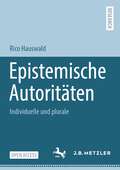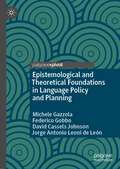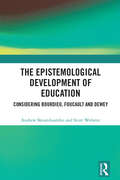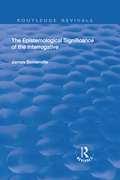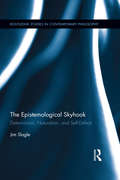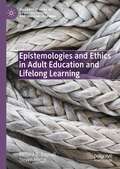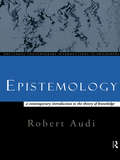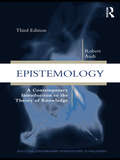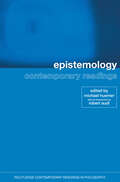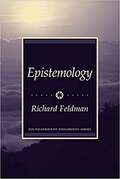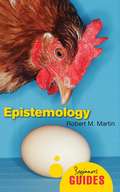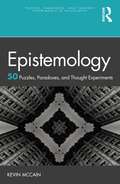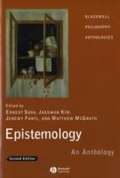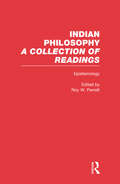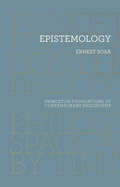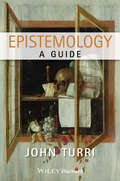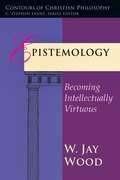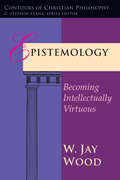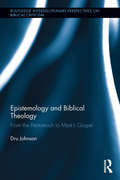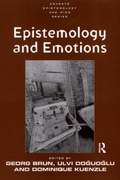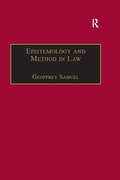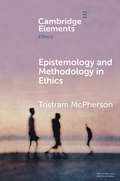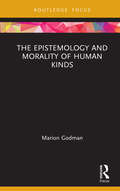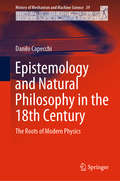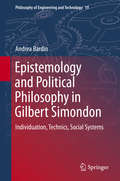- Table View
- List View
Epistemische Autoritäten: Individuelle und plurale
by Rico HauswaldDas primäre Ziel dieses Open-Access-Buches besteht in der Entwicklung einer Theorie pluraler epistemischer Autoritäten. Epistemische Autoritäten spielen in unserer durch Spezialisierung geprägten und hochgradig arbeitsteilig organisierten modernen „Informations-“ oder „Wissensgesellschaft“ eine zentrale Rolle. Die Philosophie hat diesem Umstand in den letzten Jahren durch eine zunehmend intensive Diskussion Rechnung getragen. Ein entscheidendes Defizit dieser Debatte besteht nach Diagnose des Autors allerdings darin, dass sie sich fast ausschließlich auf individuelle epistemische Autoritäten konzentriert hat. In unserer epistemischen Praxis sind plurale epistemische Autoritäten – d.h. wissenschaftliche Gemeinschaften, Expertengremien, Geschworenenjurys usw. – aber mindestens genauso bedeutsam. Wir berufen uns auf „wissenschaftlichen Konsens“, orientieren uns an „herrschenden Meinungen“ usw. und stützen uns damit auf plurale epistemische Autoritäten. Das Buch möchte die Potentiale, aber auch die Herausforderungen und Fallstricke analysieren, die diese Praxis des Sich-Stützens auf plurale epistemische Autoritäten mit sich bringt.
Epistemological and Theoretical Foundations in Language Policy and Planning
by Michele Gazzola David Cassels Johnson Federico Gobbo Jorge Antonio Leoni de LeónThis book advances the growing area of language policy and planning (LPP) by examining the epistemological and theoretical foundations that engendered and sustain the field, drawing on insights and approaches from anthropology, linguistics, economics, political science, and education to create an accessible and inter-disciplinary overview of LPP as a coherent discipline. Throughout the book, the authors address LPP from different perspectives, exploring the interface between planning in theory and its practical problems in implementation. This volume will be of interest to students and scholars with an interest in LPP in particular, and educational, social, and public policy more broadly.
The Epistemological Development of Education: Considering Bourdieu, Foucault and Dewey
by Andrew Skourdoumbis Scott WebsterThis book documents the political and economic ramifications of the policy impetus for a ‘science of education’ and what this means for classroom teachers, their teaching practices and for the field of education. In a critical exploration of current research and policy articulations of the purposes of education, with attention given to Australia, the UK and the USA, this book delineates the evaluative mechanisms involved in the strategic science as method adoption of accountability, competitiveness and test-driven criteria used in major education policy. It brings together the disciplines of sociology and philosophy by drawing on the theoretical insights of Michel Foucault, Pierre Bourdieu and John Dewey. In addition, the book argues for the deliberate use of the theoretical in education and is against the contemporary unquestioning advocacy that often accompanies a narrowly defined master narrative of a science of education. This book will be of special interest to post-graduate students as source material in general education courses and is also intended for academics with an interest in educational theory/philosophy and the sociology of education.
The Epistemological Significance of the Interrogative (Ashgate New Critical Thinking In Philosophy Ser.)
by James SomervilleThis title was first published in 2002.This book challenges prevalent assumptions regarding questions and enquiry. It argues that instead of trying to understand questions by reference to knowledge, knowledge can be conceived by reference to the distinctive logical form exhibited by questions. Interrogative logical form has not hitherto been recognised by logicians or philosophers generally. By providing an analysis which can serve as the basis for a fresh start in epistemology, this book breaks new ground.
The Epistemological Skyhook: Determinism, Naturalism, and Self-Defeat (Routledge Studies in Contemporary Philosophy)
by Jim SlagleThroughout philosophical history, there has been a recurring argument to the effect that determinism, naturalism, or both are self-referentially incoherent. By accepting determinism or naturalism, one allegedly acquires a reason to reject determinism or naturalism. The Epistemological Skyhook brings together, for the first time, the principal expressions of this argument, focusing primarily on the last 150 years. This book addresses the versions of this argument as presented by Arthur Lovejoy, A.E. Taylor, Kurt Gödel, C.S. Lewis, Norman Malcolm, Karl Popper, J.R. Lucas, William Hasker, Thomas Nagel, Alvin Plantinga, and others, along with the objections presented by their many detractors. It concludes by presenting a new version of the argument that synthesizes the best aspects of the others while also rendering the argument immune to some of the most significant objections made to it.
Epistemologies and Ethics in Adult Education and Lifelong Learning (Palgrave Studies in Adult Education and Lifelong Learning)
by Richard G. Bagnall Steven HodgeThis book presents and advocates for a framework of competing epistemologies and conceptions of ethics as a way of understanding modernist lifelong learning. These epistemologies are grounded in a recognition of the normative nature of knowledge that informs lifelong learning; each being framed by a different account of the sort of knowledge that is most valued and therefore foregrounded in lifelong learning policy, provision and engagement informed by the epistemology. Each epistemology is also characterised by its constituent conception of ethics. Four such epistemologies and conceptions of ethics are here recognised as having been important in the lifelong learning movement to date: disciplinary, developmental, emancipatory, and design. The authors argue that assumptions about knowledge and moral positions constitute a powerful but not well-understood feature of such arguments: awareness of these assumptions and positions could serve to powerfully advance the overall understanding of what is at stake in lifelong learning and adult education at all levels.
Epistemology: A Contemporary Introduction to the Theory of Knowledge
by Robert AudiFirst Published in 1997. Routledge is an imprint of Taylor & Francis, an informa company.
Epistemology: A Contemporary Introduction to the Theory of Knowledge (3rd Edition)
by Robert AudiEpistemology, or “the theory of knowledge,” is concerned with how we know what we know, what justifies us in believing what we believe, and what standards of evidence we should use in seeking truths about the world and human experience. This comprehensive introduction to the field of epistemology explains the concepts and theories central to understanding knowledge. Along with covering the traditional topics of the discipline in detail, Epistemology explores emerging areas of research. The third edition features new sections on such topics as the nature of intuition, the skeptical challenge of rational disagreement, and “the value problem” – the range of questions concerning why knowledge and justified true belief have value beyond that of merely true belief. Updated and expanded, Epistemology remains a superb introduction to one of the most fundamental fields of philosophy. Special features of the third edition of Epistemology include: a comprehensive survey of basic concepts, major theories, and emerging research in the field enhanced treatment of key topics such as contextualism, perception (including perceptual content), scientific hypotheses, self-evidence and the a priori, testimony, understanding, and virtue epistemology expanded discussion of the relation between epistemology and related fields, especially philosophy of mind, philosophy of science, and ethics increased clarity and ease of understanding for an undergraduate audience an updated list of key literature and annotated bibliography.
Epistemology: Contemporary Readings (Routledge Contemporary Readings in Philosophy)
by Robert Audi Michael HuemerThis comprehensive anthology draws together classic and contemporary readings by leading philosophers on epistemology. Ideal for any philosophy student, it will prove essential reading for epistemology courses, and is designed to complement Robert Audi's textbook Epistemology: A Contemporary Introduction (Routledge, 1998).Themes covered include, perception, memory, inductive inference, reason and the a priori, the architecture of knowledge, skepticism, the analysis of knowledge, testimony. Each section begins with an introductory essay, guiding students into the topic.Includes articles by:Russell, Hume, Berkeley, Malcolm, Quine, Carnap, J.L. Austin, Pollock, Nozick, Putnam, G.E. Moore, Huemer, Reid, Plato, BonJour, Coady, Carroll, Fumerton, Edwards, Foster, Howson, Urbach, Stove, Empiricus, Oakley, Alston, Gettier, Clark, Goldman, Lehrer, Paxson, DeRose, Dretske, Klein and Chisholm
Epistemology
by Richard FeldmanFor courses in Epistemology. <p><p> Introduction to contemporary epistemology. Content is organized around “The Standard View”―the view that we do know most of the things reflective common sense tells us we know. Skepticism is discussed as only one of several objections to the view.
Epistemology: A Beginner's Guide (Beginner's Guides)
by Robert M. MartinEpistemology is the philosophical study of knowledge. Without knowledge, scientific enquiry is meaningless and we can't analyse the world around us. But what exactly is it and how do we obtain it? Presuming no prior experience of philosophy, this book covers everything in the topic from scepticism and induction to Kant's transcendentalism.
Epistemology: 50 Puzzles Paradoxes And Thought Experiments (Puzzles, Paradoxes, and Thought Experiments in Philosophy)
by Kevin McCainIn this new kind of entrée to contemporary epistemology, Kevin McCain presents fifty of the field’s most important puzzles, paradoxes, and thought experiments. Assuming no familiarity with epistemology from the reader, McCain titles each case with a memorable name, describes the details of the case, explains the issue(s) to which the case is relevant, and assesses its significance. McCain also briefly reviews the key responses to the case that have been put forward, and provides a helpful list of suggested readings on the topic. Each entry is accessible, succinct, and self-contained. Epistemology: 50 Puzzles, Paradoxes, and Thought Experiments is a fantastic learning tool as well as a handy resource for anyone interested in epistemological issues. Key Features: Though concise overall, offers broad coverage of the key areas of epistemology. Describes each imaginative case directly and in a memorable way, making the cases accessible and easy to remember. Provides a list of Suggested Readings for each case, divided into General Overviews, Seminal Presentations, and Other Important Discussions.
Epistemology: An Anthology (Second Edition)
by Matthew Mcgrath Jaegwon Kim Ernest Sosa Jeremy FantlNew and thoroughly updated, Epistemology: An Anthology continues to represent the most comprehensive and authoritative collection of canonical readings in the theory of knowledge. Concentrates on the central topics of the field, such as skepticism and the Pyrrhonian problematic, the definition of knowledge, and the structure of epistemic justification Offers coverage of more specific topics, such as foundationalism vs coherentism, and virtue epistemology Presents wholly new sections on 'Testimony, Memory, and Perception' and 'The Value of Knowledge' Features modified sections on 'The Structure of Knowledge and Justification', 'The Non-Epistemic in Epistemology', and 'The Nature of the Epistemic' Includes many of the most important contributions made in recent decades by several outstanding authors
Epistemology: Indian Philosophy (Indian Philosophy Ser. #Vol. 1)
by Roy W. PerrettFirst Published in 2001. Routledge is an imprint of Taylor & Francis, an informa company.
Epistemology
by Ernest SosaIn this concise book, one of the world's leading epistemologists provides a sophisticated, revisionist introduction to the problem of knowledge in Western philosophy. Modern and contemporary accounts of epistemology tend to focus on limited questions of knowledge and skepticism, such as how we can know the external world, other minds, the past through memory, the future through induction, or the world’s depth and structure through inference. This book steps back for a better view of the more general issues posed by the ancient Greek Pyrrhonists. Returning to and illuminating this older, broader epistemological tradition, Ernest Sosa develops an original account of the subject, giving it substance not with Cartesian theology but with science and common sense.Descartes is a part of this ancient tradition, but he goes beyond it by considering not just whether knowledge is possible at all but also how we can properly attain it. In Cartesian epistemology, Sosa finds a virtue-theoretic account, one that he extends beyond the Cartesian context. Once epistemology is viewed in this light, many of its problems can be solved or fall away.The result is an important reevaluation of epistemology that will be essential reading for students and teachers.
Epistemology: A Guide
by John TurriDesigned to accompany Epistemology: An Anthology or stand alone as a concise primer, this is a straightforward and accessible introduction to contemporary epistemology for those studying the topic for the first time. A step-by-step introduction to contemporary epistemology, with coverage of skepticism, epistemic justification, epistemic closure, virtue epistemology, naturalized epistemology, and more Explains the main arguments of the most influential publications from the last 50 years Contextualizes key concepts and themes, instead of treating them in isolation Straightforward and accessible for those studying the topic for the first time Designed to accompany the second edition of Epistemology: An Anthology (Wiley Blackwell, 2008), but stands on its own as a concise introduction to the key ideas and arguments in epistemology
Epistemology: Becoming Intellectually Virtuous (Contours Of Christian Philosophy)
by W. WoodHow do we know what we know? What have wisdom, prudence and studiousness to do with justifying our beliefs? Jay Wood begins this introduction to epistemology by taking an extended look at the idea of knowing within the context of the intellectual virtues. He then surveys current views of foundationalism, epistemic justification and reliabilism. Finally he examines the relationship of epistemology to religious belief, and the role of emotions and virtues in proper cognitive functioning Professors will find this text, with its many examples drawn from everyday student experience, especially useful in introducing students to the formal study of epistemology.
Epistemology: Becoming Intellectually Virtuous (Contours of Christian Philosophy)
by W. Jay WoodHow do we know what we know? What have wisdom, prudence and studiousness to do with justifying our beliefs? Jay Wood begins this introduction to epistemology by taking an extended look at the idea of knowing within the context of the intellectual virtues. He then surveys current views of foundationalism, epistemic justification and reliabilism. Finally he examines the relationship of epistemology to religious belief, and the role of emotions and virtues in proper cognitive functioning Professors will find this text, with its many examples drawn from everyday student experience, especially useful in introducing students to the formal study of epistemology.
Epistemology and Biblical Theology: From the Pentateuch to Mark’s Gospel (Routledge Interdisciplinary Perspectives on Biblical Criticism)
by Dru JohnsonEpistemology and Biblical Theology pursues a coherent theory of knowledge as described across the Pentateuch and Mark's Gospel. As a work from the emerging field of philosophical criticism, this volume explores in each biblical text both narrative and paraenesis to assess what theory of knowledge might be presumed or advocated and the coherence of that structure across texts. In the Pentateuch and Mark, primacy is placed on heeding an authenticated and authoritative prophet, and then enacting the guidance given in order to see what is being shown—in order to know. Erroneous knowing follows the same boundaries: failure to attend to the proper authoritative voice or failure to enact guidance creates mistaken understanding. With a working construct of proper knowing in hand, points of contact with and difficulties for contemporary philosophical epistemologies are suggested. In the end, Michael Polanyi’s scientific epistemology emerges as the most commensurable view with knowing as it appears in these foundational biblical texts. Therefore, this book will be of interest to scholars working across the fields of Biblical studies and philosophy.
Epistemology and Emotions (Ashgate Epistemology And Mind Ser.)
by Georg Brun Ulvi DoguogluUndoubtedly, emotions sometimes thwart our epistemic endeavours. But do they also contribute to epistemic success? The thesis that emotions 'skew the epistemic landscape', as Peter Goldie puts it in this volume, has long been discussed in epistemology. Recently, however, philosophers have called for a systematic reassessment of the epistemic relevance of emotions. The resulting debate at the interface between epistemology, theory of emotions and cognitive science examines emotions in a wide range of functions. These include motivating inquiry, establishing relevance, as well as providing access to facts, beliefs and non-propositional aspects of knowledge. This volume is the first collection focusing on the claim that we cannot but account for emotions if we are to understand the processes and evaluations related to empirical knowledge. All essays are specifically written for this collection by leading researchers in this relatively new and developing field, bringing together work from backgrounds such as pragmatism and scepticism, cognitive theories of emotions and cognitive science, Cartesian epistemology and virtue epistemology.
Epistemology and Method in Law (Applied Legal Philosophy #17)
by Geoffrey SamuelThis book seeks to question the widely held assumption in Europe that to have knowledge of law is simply to have knowledge of rules. There is a knowledge dimension beyond the symbolic which reaches right into the way facts are perceived, constructed and deconstructed. In support of this thesis the book examines, generally, the question of what it is to have knowledge of law; and this examination embraces not just the conceptual foundations, methods, taxonomy and theories used by jurists. It also examines the epistemological schemes used by social scientists in general in order to show that such schemes are closely related to the schemes of intelligibility used by lawyers and judges.
Epistemology and Methodology in Ethics (Elements in Ethics)
by Tristram McPhersonThis Element introduces several prominent themes in contemporary work on the epistemology and methodology of ethics. Topics addressed include skeptical challenges in ethics, epistemic arguments in metaethics, what (if anything) is epistemically distinctive of the ethical. Also considered are methodological questions in ethics, including questions about which ethical concepts we should investigate, and what our goals should be in ethical inquiry.
The Epistemology and Morality of Human Kinds (Routledge Focus on Philosophy)
by Marion GodmanNatural kinds is a widely used and pivotal concept in philosophy – the idea being that the classifications and taxonomies employed by science correspond to the real kinds in nature. Natural kinds are often opposed to the idea of kinds in the human and social sciences, which are typically seen as social constructions, characterised by changing norms and resisting scientific reduction. Yet human beings are also a subject of scientific study.Does this mean humans fall into corresponding kinds of their own? In The Epistemology and Morality of Human Kinds Marion Godman defends the idea of human kinds. She first examines the scientific use and nature of human kinds, considering the arguments of key philosophers whose work bears upon human kinds, such as Ian Hacking, John Searle, Richard Boyd and Ruth Millikan. Using the examples of gender, ethnic minorities and Buddhism she then argues that human kinds are a result of ongoing historical reproduction, chiefly due to pre-existing cultural models and social learning. Her novel argument shifts the focus away from the reductionism characteristic of research about human kinds. Instead, sheargues that they are “multiply projectable” and deserving of scientific study not in spite of, but because of their role in explaining our identity, injusticeand the emergence of group rights.
Epistemology and Natural Philosophy in the 18th Century: The Roots of Modern Physics (History of Mechanism and Machine Science #39)
by Danilo CapecchiThis book documents the process of transformation from natural philosophy, which was considered the most important of the sciences until the early modern era, into modern disciplines such as mathematics, physics, natural history, chemistry, medicine and engineering. It focuses on the 18th century, which has often been considered uninteresting for the history of science, representing the transition from the age of genius and the birth of modern science (the 17th century) to the age of prodigious development in the 19th century. Yet the 18th century, the century of Enlightenment, as will be demonstrated here, was in fact characterized by substantial ferment and novelty. To make the text more accessible, little emphasis has been placed on the precise genesis of the various concepts and methods developed in scientific enterprises, except when doing so was necessary to make them clear. For the sake of simplicity, in several situations reference is made to the authors who are famous today, such as Newton, the Bernoullis, Euler, d’Alembert, Lagrange, Lambert, Volta et al. – not necessarily because they were the most creative and original minds, but mainly because their writings represent a synthesis of contemporary and past studies. The above names should, therefore, be considered more labels of a period than references to real historical characters.
Epistemology and Political Philosophy in Gilbert Simondon
by Andrea BardinThis combination of historiography and theory offers the growing Anglophone readership interested in the ideas of Gilbert Simondon a thorough and unprecedented survey of the French philosopher's entire oeuvre. The publication, which breaks new ground in its thoroughness and breadth of analysis, systematically traces the interconnections between Simondon's philosophy of science and technology on the one hand, and his political philosophy on the other. The author sets Simondon's ideas in the context of the epistemology of the late 1950s and the 1960s in France, the milieu that shaped a generation of key French thinkers such as Deleuze, Foucault and Derrida. This volume explores Simondon's sources, which were as eclectic as they were influential: from the philosophy of Bergson to the cybernetics of Wiener, from the phenomenology of Merleau-Ponty to the epistemology of Canguilhem, and from Bachelard's philosophy of science to the positivist sociology and anthropology of luminaries such as Durkheim and Leroi-Gourhan. It also tackles aspects of Simondon's philosophy that relate to Heidegger and Elull in their concern with the ontological relationship between technology and society and discusses key scholars of Simondon such as Barthélémy, Combes, Stiegler, and Virno, as well as the work of contemporary protagonists in the philosophical debate on the relevance of technique. The author's intimate knowledge of Simondon's language allows him to resolve many of th e semantic errors and misinterpretations that have plagued reactions to Simondon's many philosophical neologisms, often drawn from his scientific studies.
